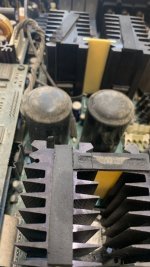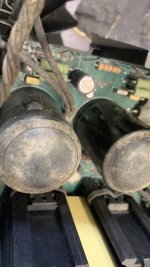I have two Arcam A22 amplifiers with same issue. The capacitors seem to have blown as in the attached photo.
The capacitors say on them:
Aerovox ALC10A 103DF063.
Can someone help me what I need to buy I made a search online and it brings me on Mouser electronics or are Components in UK for a KEMET capacitor with slightly different number.
Also as this seems to be common amongst this particular amp can you recommend any capacitors that hopefully last longer?
Thanks
The capacitors say on them:
Aerovox ALC10A 103DF063.
Can someone help me what I need to buy I made a search online and it brings me on Mouser electronics or are Components in UK for a KEMET capacitor with slightly different number.
Also as this seems to be common amongst this particular amp can you recommend any capacitors that hopefully last longer?
Thanks
Attachments
That is exactly what they look like after a number of years use and probably nothing wrong at all.
The vent is at the connector end, the top plastic tends to bend like like naturally and has no affect on the use or reliability of the capacitor.
In other words, if it is leaking on the boards, replace it otherwise leave it alone as that is what they look like over time.
The vent is at the connector end, the top plastic tends to bend like like naturally and has no affect on the use or reliability of the capacitor.
In other words, if it is leaking on the boards, replace it otherwise leave it alone as that is what they look like over time.
Can you read the voltage and capacitance? Might help. Replacement caps because of better technology will be smaller today, which let's them run cooler and last longer anyway.
Carefully remove one of the plastic rounds on top, if the aluminum is not bend just clean up the board.
Carefully remove one of the plastic rounds on top, if the aluminum is not bend just clean up the board.
Oh I see cause in one of the Arcam 10 amp which is identical to the A22 someone had cut the tops off and thought there was a problem!That is exactly what they look like after a number of years use and probably nothing wrong at all.
The vent is at the connector end, the top plastic tends to bend like like naturally and has no affect on the use or reliability of the capacitor.
In other words, if it is leaking on the boards, replace it otherwise leave it alone as that is what they look like over time.
Ok then, the amplifier briefly switches on and blows the fuse I'm wondering where i should start looking...
Do you have any experience in repairing amps? Do you have tools? Oscilloscope, voltmeter, soldering iron etc? Do you know how to use a tone generator in amp testing?
Best to localize the problem first, before starting to replace parts.
Often more problems are created, while trying to shotgun a repair.
The capacitors can be measured, and the results compared to the mfr specs.
Often more problems are created, while trying to shotgun a repair.
The capacitors can be measured, and the results compared to the mfr specs.
The primary question is, can the thread starter localize a problem inside an amp. These amps seem to be incredible dirty. Maybe first explain to him how to clean that mess up? A starter would be compressed air...
First I would vacuum up as much dirt as possible. Then carefully wipe up the really bad areas.
Only then use compressed air where necessary.
Only then use compressed air where necessary.
Last edited:
I used to repair laptops for a living up to 10 years ago and had to desolder eeproms etc from the motherboard and I am good with soldering/desoldering. Do I have experience with amps, No however I have been able to fix my old Arcam 3 and isolate a problem to a faulty power transistor using a multimeter that it was shorted.Do you have any experience in repairing amps? Do you have tools? Oscilloscope, voltmeter, soldering iron etc? Do you know how to use a tone generator in amp testing?
But I am here to make a start with amps... Also I do own a Hameg HM605 Oscilloscope but I don't really know how to use it!
Yes I have done this. I have now two of these amps that have an identical issue! Both are blowing the internal fuse.First I would vacuum up as much dirt as possible. Then carefully wipe up the really bad areas.
Only then use compressed air where necessary.
Bulging capacitors is not normal. I would defintiely change them.
RSWWW or Mouser UK will have direct replacements. They are 10,000 uf 63v, 35mm dia.'snap in'.
Just check the pin spacing and height.
For testing, replace the fuses with a 22r power resistor and see which gets hot. Probbaly one of the output tranisistors is short circuit. (my Arcam amp has fuses in the supply rails)
Alternatively, take out the power transistors and just fit replacements - they aren't expensive.
RSWWW or Mouser UK will have direct replacements. They are 10,000 uf 63v, 35mm dia.'snap in'.
Just check the pin spacing and height.
For testing, replace the fuses with a 22r power resistor and see which gets hot. Probbaly one of the output tranisistors is short circuit. (my Arcam amp has fuses in the supply rails)
Alternatively, take out the power transistors and just fit replacements - they aren't expensive.
Your scope is fine, perfect for repair work. What you also need is some kind of signal. For simple repair an old smartphone with a 1kHz app is all you need. A phone can be used without ground, just run on its own battery.
Anyway, for your problem such gear is not what you need. First you have to find the cause for the short.
How you do that depends on the amp. A look into the schematic will show you what kind of component can cause such a short. If you can remove any fuses between the power supply and the amp stages, this would be a start. A multimeter can give you a hint where the short is located.
First check rectifier and the PS capacitors. Next are the amps power stage transistors.
Without a schematic this is all I can recommand for a beginner.
That you are able to solder is quite an advantage. Many amps are butchered by people not able to handle a soldering iron...
Anyway, for your problem such gear is not what you need. First you have to find the cause for the short.
How you do that depends on the amp. A look into the schematic will show you what kind of component can cause such a short. If you can remove any fuses between the power supply and the amp stages, this would be a start. A multimeter can give you a hint where the short is located.
First check rectifier and the PS capacitors. Next are the amps power stage transistors.
Without a schematic this is all I can recommand for a beginner.
That you are able to solder is quite an advantage. Many amps are butchered by people not able to handle a soldering iron...
- Home
- Amplifiers
- Solid State
- Help with choosing capacitors for an Amplifier

